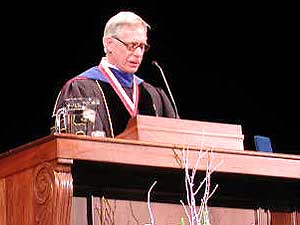|
Photos
More from MPR
Resources
Your Voice
|
U of M must reveal names of presidential finalists
July 15, 2004
St. Paul, Minn. — (AP) - The state Supreme Court ordered the University of Minnesota on Thursday to reveal the names of candidates the Board of Regents interviewed for the school's presidency in a 2002 search that ended with the hiring of in-house candidate Robert Bruininks.
Upholding lower court rulings, justices lifted a stay that allowed the university to keep the presidential search information private. It marks a victory for five media organizations that sued to open the records, arguing that such a decision is an important public matter because the university is a public institution.
"My clients are not criticizing the quality of President Bruininks but it's important to understand who else was considered and how the process completely played out," said John Borger, attorney for the media organizations.
University officials were predictably discouraged by losing the case they worked on for two years.
|
My clients are not criticizing the quality of President
Bruininks, but it's important to understand who else was considered
and how the process completely played out.
- John Borger, plaintiffs' attorney |
"We are, of course, disappointed in the outcome here today," said university General Counsel Mark Rotenberg on Thursday, "but we respect the court's thoughtfulness and the extensive opinions that were issued."
There are no more appeals available, so Rotenberg said he will work out a process to release the names of the candidates with the plaintiffs' attorneys. He said the candidates would be notified by the university in advance.
University lawyers had argued that the school's autonomy under the state constitution freed regents from certain requirements in open-meeting and data-practices laws. They compared the selection of the president to the hiring of a company chief executive, and said some candidates would be discouraged to apply if their current employer could find out.
Justice Russell Anderson, writing for a divided court, said the concerns are not enough to justify secrecy.
"That some candidates for a high profile public post may choose not to make themselves available publicly is not enough. The fact is that presidential searches in a majority of states are subject to public access statutes at least as broad as the Data Practices Act and Open Meeting Law," he wrote.
He was joined in the opinion by Justices Kathleen Blatz, Paul Anderson and Helen Meyer. Dissenting were Justices James Gilbert and Sam Hanson. Justice Alan Page, a former regent, was not involved in the decision.
In his dissent, Gilbert said the decision to apply the openness laws marks an unnecessary intrusion into university affairs.
"The application of these statutes to the presidential search process interferes with and obstructs the power given to the Board of Regents to select a president, which may be the most fundamental internal management decision of the Board of Regents," he wrote.
The five news organizations that sued were the St. Paul Pioneer Press, the Star Tribune of Minneapolis, the university's Minnesota Daily, the Rochester Post-Bulletin and the Minnesota Joint Media Committee. They wanted release of the names and other information about job finalists.
(Copyright 2004 by The Associated Press. All Rights Reserved.)
|
News Headlines
|
Related Subjects
|

